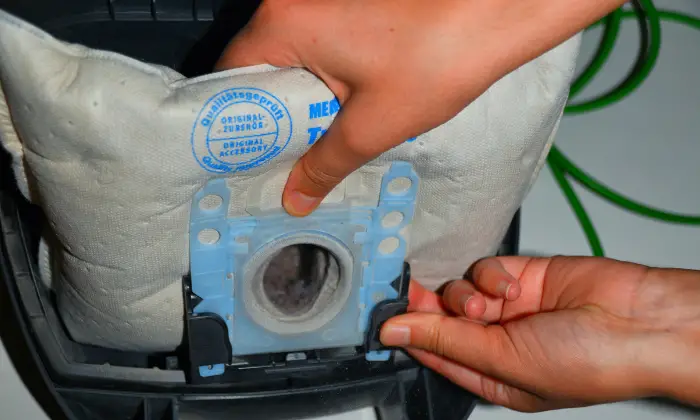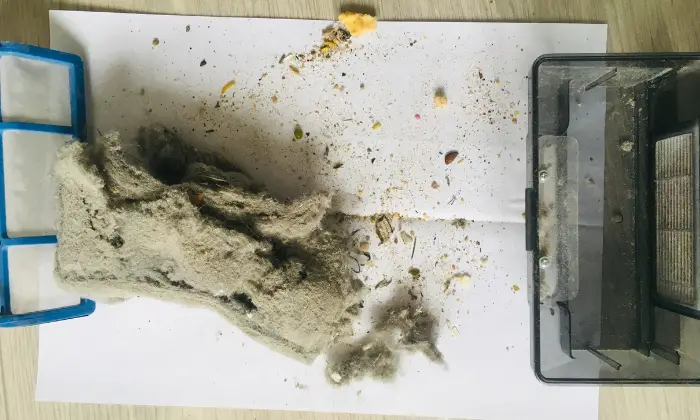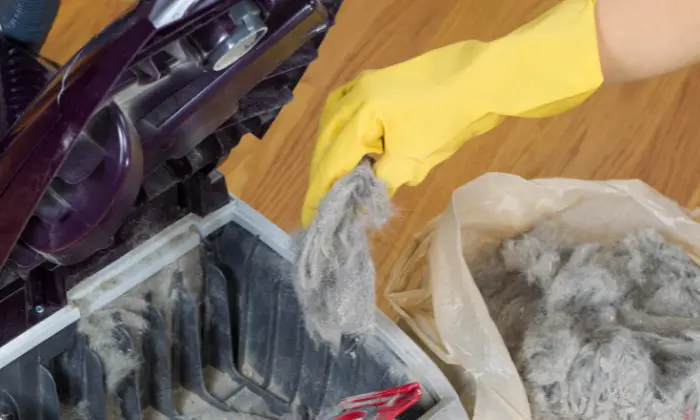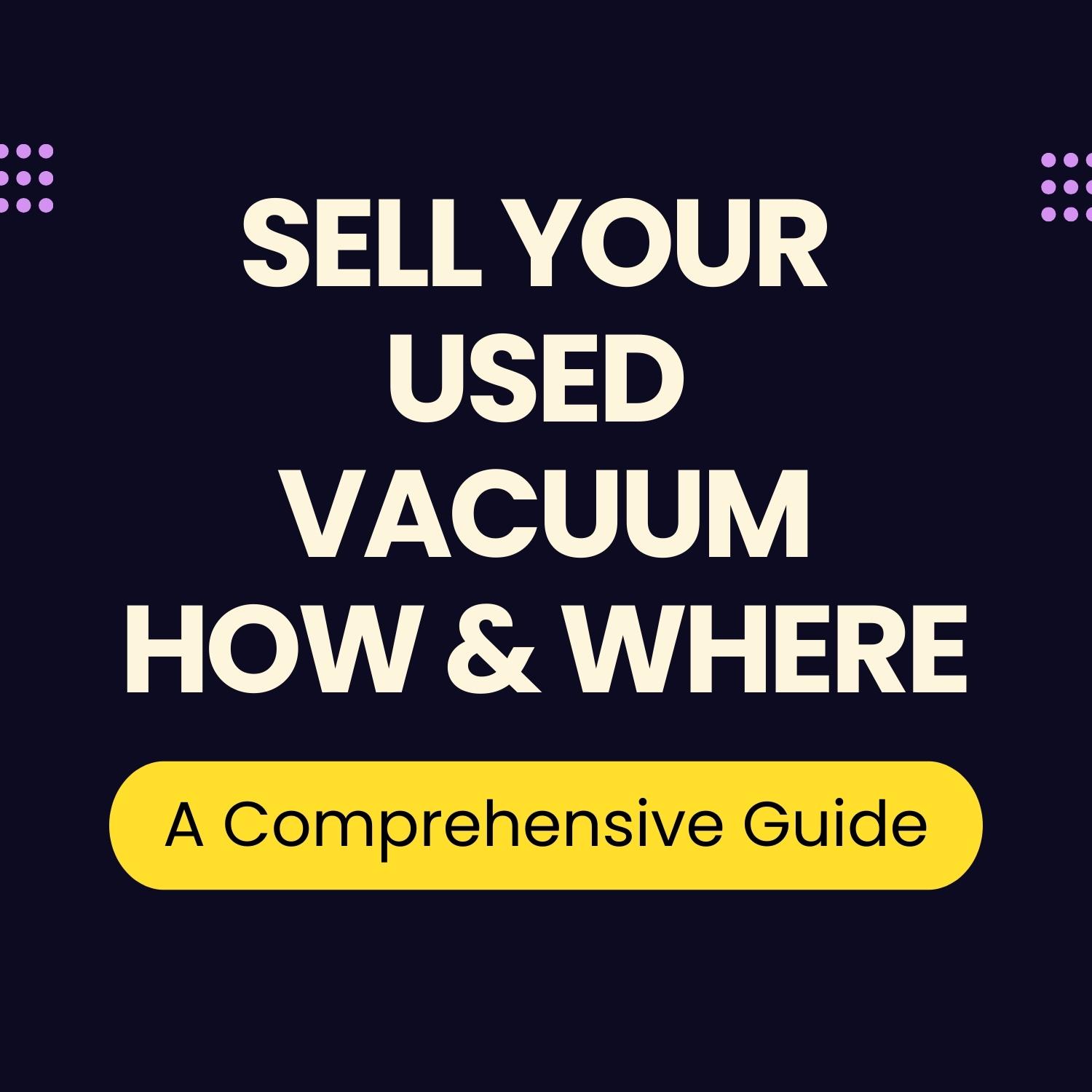
You may be wondering if vacuum cleaner dust can go in the compost. The short answer is yes, it can. However, there are some things to keep in mind when can you put vacuum cleaner dust in the compost.
In this article, we will explore the benefits of adding vacuum cleaner dust to your compost bin, and provide some tips on how to do it safely. Let’s get started!
Know Your Dust Type (The Dust Myth)
It’s no secret that keeping your house and garden clean is essential. But what about vacuum cleaner dust? Is it safe to put dust and debris in the compost? The short answer is no – vacuum cleaner dust is not the same as garden soil, so you can’t put it in the compost.
Even if it could, it would only worsen your plants and soil. Instead of risking it, avoid placing anything from a dusty environment into your home, even if you think it’s safe!
If you still have questions about what can you put vacuum cleaner dust in the compost, what cannot go into your compost pile, speak with a specialist or call an organic waste collection service.

Things to know before putting vacuum cleaner dust in the compost
Dirt, dust, and other small particulates are important to any healthy compost pile. They help to aerate the compost and encourage microbial activity. However, a few simple things to remember before adding vacuum cleaner dust to your compost pile.
First, ensure that the dust is free of chemicals or other pollutants. Second, if the dust is from a carpet, it may contain synthetic fibers that will not break down in the compost.
Finally, be sure to add a variety of other materials to the pile, such as food scraps and leaves, to ensure proper aeration and drainage. Following these simple guidelines ensures that your vacuum cleaner dust will help create a healthy and productive compost pile.
Can you put vacuum dust in the compost?
Can you put vacuum dust in the compost? This is a question that we receive a lot at the recycling center. And the answer is yes!
In fact, vacuum dust can be a great addition to your compost pile. Vacuum dust is full of organic matter, which helps to promote decomposition. Additionally, the dust can help to aerate the compost and improve drainage.
As a result, adding vacuum dust to your compost can help to speed up the decomposition process. Just be sure to add a thin layer of dust to the compost, as too much can prevent oxygen from reaching the organic matter.
Composting is a great way to reduce waste and create nutrient-rich soil for your garden. But what about all that dust that accumulates in your vacuum cleaner? Can you add it to your compost pile?
Of course, you can add vacuum cleaner dust to your compost, but there are a few things you should keep in mind. First, make sure that the dust is from a HEPA – filtered vacuum.
This will ensure that there are no harmful chemicals or particulates in the dust. Second, be aware that the dust may contain animal hair and dander traces.
If you have allergies, it might be best to avoid adding vacuum cleaner dust to your compost.
Finally, remember that too much dust can actually inhibit the decomposition process. So add it in moderation and keep an eye on your compost pile to make sure it’s not getting too dry.
With a little care, you can safely add vacuum cleaner dust to your compost pile. And who knows? Maybe your plants will thank you for it!
Composting isn’t just for kitchen scraps and leaves. You can put vacuum cleaner dust in the compost too! However, before you do, make sure to read the composting guidelines carefully to find out if it’s okay to do so.
In general, vacuum cleaner dust needs to be broken down before being added to the compost bin. You’ll need to crush it into small pieces before adding it. And if you’re worried about harmful chemicals in the dust, don’t.
It doesn’t contain any. As long as you’re following the composting guidelines that are specific to vacuum cleaner dust, you’re good to go!
What Types of Wastage Should Not Be Composted?

Composting may seem like a tedious task, but it’s pretty simple. All you need to do is follow these simple rules.
First, ensure that the waste you plan to compost is compostable – this includes vacuum cleaner dust, furniture polish, pet hair or human hair, skin flakes, dead skin, bits of soil, food scraps, and other organic combination of dust.
Next, check with your municipality to find out which types of waste are not compostable.
This will help you avoid any potential negative consequences.
Lastly, composting is not a one-time event. It’s a process that you should repeat regularly to ensure optimal composting conditions.
1. Meat Products
The most important thing to remember when composting meat products is that you should not compost them if they are not cooked thoroughly. Not only will this create an odor and pests, but it will also end up rotting the meat and making composting less desirable.
Everything else on this list, except meat and dairy, may be composted in small amounts as long as it is appropriately processed. Coffee grounds, for example, contain high levels of nutrients that help improve soil fertility. And cooked vegetables and fruits even those that aren’t 100% organic emit lactic acid, which helps break down organic material in the garden soil.
2. Tea Bags and Coffee Pods
Composting is a great way to reduce waste in our landfills. Not only does it help to improve the environment, and composting also helps conserve resources by recycling materials.
When it comes to composting tea bags and coffee pods, there are a few things you need to keep in mind, If you are unsure whether an item should go in the compost or not, ask your local waste disposal service.
They will be able to guide you if it is biodegradable or not and what needs to be done with it. Even if an item is made of paper, plastic, or some other material that you can recycle, don’t put it in the compost because dust from vacuum cleaners and other electronics can contaminate the soil with chemicals (this includes electronic items like phones).
If it is made of paper, plastic, or another type of recyclable material including cups and boxes made from these materials – then put them in your recycling bin instead.
3. Treated Lumber
There is something to watch out for when buying treated lumber. First, be sure to inspect the wood for any signs of damage or rot. Second, ensure the treatment is effective and that the sealant or paint is durable enough protection against moisture and pests.
Finally, ensure you have a proper plan in place if you need to do any repairs on the treated lumber – don’t expect it to hold up like regular wood!
4. Fertilizers
When fertilizing your plants, be aware of materials that are not compostable. These include vacuum cleaner dust, electronic and battery waste, carpet and upholstery shavings, and mattress coverings.
By composting these materials instead of putting them in the garbage bin, you help to enrich the soil with organic matter while also improving your gardening experience.
It is essential to read product labels before throwing anything away – some products may contain harmful chemicals, that shouldn’t end up in a compost pile!
5. Plastic Cutlery
When it comes to plastic Cutlery, it is always best to avoid putting them into the garbage bin. It would be best to never put sharp objects such as kitchen knives or forks in there.
They could harm someone who tries to retrieve them later on. It’s also important not to compost plastic Cutlery as this can cause blockages in the composting process.
It would be best to recycle any plastic cutlery in a recycling bin. Doing so will reduce your overall waste and help preserve natural resources for future generations!
6. Used Hygiene Products
When it comes to the composting, there are many things that people might think twice about – like coffee grounds and food waste. However, according to 6 easy composting tips for you, all of these materials can be safely composted as long as they are organic.
Moreover, if you’re still unsure about something, always check with your local council or composting organization for more information. And make sure to vacuum cleaner dust isn’t compostable because it contains small pieces of plastic!
Apart from these six items, though, most other common hygiene products (like makeup and hair products) are unsuitable for composting due to their high water content or synthetic ingredients.
Read our blog – Can You Wash Vacuum cleaner bags, to know the Good, Bad, and Ugly truths about washing your vacuum cleaner bags.
7. Infected Plants
It is vital to be aware of the various types of waste that can require unique disposal methods. This includes diseased plants, leaves, and flowers from gardens, pet droppings, and plants debris from outside.
If you are not sure whether a plant is infected or not, do not compost it! Not composting infected plants can spread harmful bacteria to other plants in your compost pile – this will cause them to harm or even kill them.
8. Feces
Composting is a great way to reduce waste and help us eliminate organic material that would otherwise end up in landfill.
However, it would be great if you avoided a few things when composting to keep your compost pile healthy and clean. It would be better if you didn’t place dead animals or anything else with blood or guts (like hair) in the compost bin.
They will contaminate it with their fluids and gooey substances. Similarly, any hair, skin, nails, or other materials that don’t naturally decompose shouldn’t go into the compost heap either. That means vomit and diarrhea stay right where they are out of your composter!
Frequently Asked Questions:
Can you add vacuum dust to compost?
Adding vacuum cleaner dust to compost is safe if treated with the appropriate levels of biodegradable and organic material. Vacuum cleaner dust is made of small, lightweight particles that can easily be added to compost and do not present any risk toxicity-wise.
Where do you put vacuum dust?
If you don’t have compost, you should put vacuum dust in the trash or outdoors. If you do have compost bin, then you should place vacuum dust inside the compost bin.

Can you put dryer lint in my compost?
Unfortunately, it is not recommended to put vacuum cleaner dust, dryer lint, or other types of household waste in the compost because they contain chemicals and materials that can harm plants. These materials can burn plant roots if they are composted near them. Instead, composting helps us recycle these materials while they break down into fertilizers, which can benefit our garden. By composting, we are turning a waste product into a valuable resource that can improve the health and well-being of plants in our garden.
What should not go into compost bins?
When composting, you should avoid putting in things like food scraps, pet hair, and plastics. These items can cause environmental damage and lead to harmful bacteria growth. Instead, compost bins are meant for organic material only. If these other items end up in there, they will create anaerobic conditions, which cause harmful bacteria growth.
Can vacuum cleaners dust be used as compost?
Yes, vacuum cleaner dust is an excellent material to add to your compost because it’s high in nitrogen and helps plant growth. Ensure that the vacuum cleaner dustbin is emptied every week so that the dirt doesn’t build up and cause issues with compost functionality. Additionally, vacuuming isn’t the only thing you can use your dustbin for – you can also use it to fertilize your plants.
How often should you clean your home, according to science?
According to science, you should only vacuum your carpets and curtains once a week. This is because vacuuming can damage these materials over time. Additionally, if you have pets or other animals that shed fur, vacuum them regularly instead of waiting for them to shed their coats on the floor. Apart from that, only dusting or sweeping the floors and surfaces once you should do a week – will help reduce asthma symptoms in children.
Can you put dog hair and cat hair in the compost?
You should not put vacuum cleaner dust in the compost as it can attract pests and cause serious garden problems. In addition, hair from pets can also clog up your compost bin and disrupt its natural process of breaking down organic matter. Instead, place pet hair in the trash where it can be disposed of quickly.
Conclusion
So, you’re thinking of adding vacuum cleaner dust to your compost heap. But you’re not sure if it’s safe? Well, don’t worry. We’re here to help! In this blog, we’ve outlined everything you need to know about composting vacuum cleaner dust before deciding. We suggest you avoid composting certain types of waste, like electronics and pet hair. So read on to learn more and make an informed composting decision for your home!
















